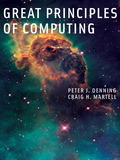
Hear how AI ChatGPT replies to the questions of concern in your class - including physics, human-technology relationships, persons-minds-machines, and more! - from Curt Jaimungal, Theories of Everything

 Great principles of computing
by
Peter J. Denning and Craig H. Martell
Great principles of computing
by
Peter J. Denning and Craig H. Martell



